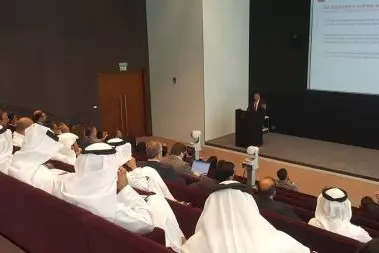PHOTO
Dubai, United Arab Emirates: Business leaders from the UAE gathered together at an ACCA event in collaboration with Thomson Reuters which took place in Abu Dhabi and Dubai to discuss the first 100 days of VAT in the UAE and how organisations can navigate adoption challenges.
During the event led by Lindsay Degouve de Nuncques, Head of ACCA Middle East; attendees heard from Dhuha Fadhel, Senior Economist at Standard Chartered Bank; Chas Roy-Chowdhury, Global Head of Taxation at ACCA; Mehrdad Talaifar, Associate Partner, Tax Technology Transformation, EY; Francois Malan, Senior Manager, Tax Technology Transformation, EY and Pierre Arman, Tax & Accounting Market Lead, Thomson Reuters on the fundamental areas that businesses need to focus on during the first 100 days of VAT.
Dhuha Fadhel commenced the morning providing an economic outlook on how VAT implementation is going to further support economic growth, followed by Chas Roy-Chowdhury who set the tone for the remainder of the event by sharing an in-depth overview of the VAT law and regulation and stated “there are a number of areas of uncertainty which we consider will be resolved over the coming months. For instance what happens in the case of long term contracts requiring staged payment invoices? Will the FTA allow a system of pro forma invoices to be used as in the UK which are like draft invoices and not accounted for until the agreed amount is set between the two contractors?”
Whilst VAT isn’t a direct cost to the company, Mehrdad Talaifar from EY highlighted that it is a “cost to the administration of the business and therefore, isn’t a calculation challenge, but an operational challenge given it impacts the entire organisation.” During the first 100 days of VAT, organisations are having to navigate various complexities in order to ensure they have a compliant reporting process embedded in the business; this in turn will lead to process redevelopment which should be effectively engrained in the internal functions of any organisation in order to ensure VAT compliance. This was further supported as Mehrdad continued that “organisations need to have a compliance framework internally to ensure they are VAT compliant for not just part of the cycle, but the entire VAT cycle.”
When looking at the role of technology and the ongoing journey, Pierre Arman from Thomson Reuters stated “The real VAT journey starts now as companies prepare to file the first return. What companies shouldn’t become is complacent once they have integrated this change.” He continued “businesses need to consider how digitisation will continue to impact tax reporting with the introduction of Blockchain and other disruptive technology.” Whilst this isn’t going to impact in the immediate turn, business leaders were made aware that they do need to continue considering the longer term impact that this may bring.
Lindsay Degouve de Nuncques, Head of ACCA Middle East concluded by stating that “the 1st of January saw the birth of the VAT regime, however this will continue to evolve and develop, in order to ensure it remains relevant in driving economic growth both in the short and longer term. Although we have seen recent reports suggesting that the 5% rate will remain unchanged for 5 years, businesses should ensure that they continue to keep up to date with key fiscal changes in taxation across not only the UAE, but the wider GCC region too which will be going through a similar implementation cycle in the imminent future.” She continued “the role of professional accountants, tax agents and technology providers remains vital but what will be key to success is ensuring greater collaboration and ongoing understanding of the evolving landscape.”
About ACCA
ACCA (the Association of Chartered Certified Accountants) is the global body for professional accountants. It offers business-relevant, first-choice qualifications to people of application, ability and ambition around the world who seek a rewarding career in accountancy, finance and management.
ACCA supports its 188,000 members and 480,000 students in 178 countries, helping them to develop successful careers in accounting and business, with the skills required by employers. ACCA works through a network of 100 offices and centres and more than 7,110 Approved Employers worldwide, who provide high standards of employee learning and development. Through its public interest remit, ACCA promotes appropriate regulation of accounting and conducts relevant research to ensure accountancy continues to grow in reputation and influence.
Founded in 1904, ACCA has consistently held unique core values: opportunity, diversity, innovation, integrity and accountability. It believes that accountants bring value to economies in all stages of development and seek to develop capacity in the profession and encourage the adoption of global standards. ACCA’s core values are aligned to the needs of employers in all sectors and it ensures that through its range of qualifications, it prepares accountants for business. ACCA seeks to open up the profession to people of all backgrounds and remove artificial barriers, innovating its qualifications and delivery to meet the diverse needs of trainee professionals and their employers. More information is here: www.accaglobal.com
About Thomson Reuters
Thomson Reuters is the world’s leading source of news and information for professional markets. Our customers rely on us to deliver the intelligence, technology and expertise they need to find trusted answers. The business has operated in more than 100 countries for more than 100 years. Thomson Reuters shares are listed on the Toronto and New York Stock Exchanges. For more information, visit www.thomsonreuters.com.
*Source: AETOSWire
Contacts:
Nav Kaur, Regional Marketing Manager
+97143642139
navdeep.dulay@accaglobal.com
Twitter @ACCANews
© Press Release 2018




















